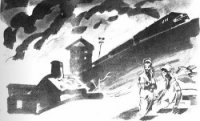Misfortune - Goldstein Lisa (читаем книги онлайн бесплатно .TXT) 📗
You look up a moment. The birds have stopped singing, a cloud has moved in front of the sun. You thought you were reading a story about someone struggling with death, with bad luck, with her own inner demons-Hamlet’s outrageous fortune. You certainly had no idea you would become involved this way. It’s too late, though-you’ve read the words, just as I have.
No, you think. She’s imagined the whole thing. Sure, a lot of bad things have happened to her, but it’s probably all just coincidence. A bunch of words in an old book-how could that possibly affect me?
It can, though, take my word for it. It happened to me. I know my life went downhill just as soon as I read those words.
You thought you were reading about someone going through a hard time. One of two things would happen-either things would get better for her, or they wouldn’t. You were prepared to follow the story from the beginning through the middle to the end, and then you were going to put it down and get on with your life. You were prepared to feel better after it was all over-if it ended happily you’d feel good, of course, but if it didn’t you’d still experience the catharsis Aristotle talked about. You were going to feel good watching me suffer.
And now you’re the one who’s going to suffer. What do you think of that?
I stopped going out. I skipped auditions. I sat on my floor and stared at my carpet, which was a truly hideous shade of brown. I spent a lot of time wondering why anyone would make a carpet that color. And when I wasn’t worrying about my carpet I thought about Jessie.
I couldn’t turn on the television without seeing her. There were ads for her movie, there was Jessie herself being featured on some entertainment show or talking to Jay Leno about what a sweetie Harrison was. And when her movie came out it got worse. I didn’t go see it, of course-there was my carpet to think of-but just about all the critics liked it. The skinny guy on that Sunday evening movie review program practically fell in love with her, though the fat guy didn’t go that far. No one noticed that she wasn’t a very good actress, that she was missing something. I wondered if, in addition to all my other problems, I was going crazy.
Whenever I went to the supermarket, there was her picture waiting for me, on the cover of People or some tabloid. One month she was even featured in a house and garden magazine, with pictures of the interior of her Malibu condo. I couldn’t help myself-I paged through the article while standing in the check-out line. She’d told the reporter that she wanted to create a space filled with light. I doubted it-she had terrible taste, could barely even dress herself. Probably that was something her interior decorator had said.
I’d been invited to that condo, not once but dozens of times. She urged me to come along with her to parties, told me about the directors and producers who would be there. She offered to take me to dinner. I made excuses, stopped returning her calls. All I needed, I thought, was to owe Jessie my career. No, I’ll be honest here-I just didn’t want to see her.
I thought a lot about envy. In college I had been in a production of Marlowe’s Dr. Faustus, in the scene with the seven deadly sins. I’d played Envy: "I am Envy, begotten of a chimney-sweeper and an oyster-wife… I am lean with seeing others eat. Oh, that there would come a famine over all the world, that all might die, and I live alone, then thou should’st see how fat I’d be!"
If I tried I could remember the six other sins-pride, anger, gluttony, sloth, lechery, and greed. Envy was definitely my sin, though. I thought I would have taken almost any of the others: pride, lechery, even gluttony. Sloth would be good. Here I was, I thought bitterly, envying other people their sins.
The phone rang. I worried that it was Jessie, full of more cheerful good news, but for some reason I answered it. It turned out to be Ellen, a friend of mine from college, and I relaxed.
"Hey, isn’t that woman in the movie Jessie What’s-her-name?" Ellen asked after we’d caught up on news. "I met her once at your house, didn’t I?"
"Yeah," I said.
"Well, give her my congratulations. It must be exciting for her."
"Yeah," I said again. There was silence-a puzzled silence, I thought-at the other end of the line. "I guess this proves beyond a doubt that Hollywood values looks over talent," I said finally.
Ellen laughed. "I thought she was a friend of yours," she said. "I guess not."
"I guess not," I said.
I felt briefly better, and then a whole lot worse. What was I saying? Jessie was a friend, wasn’t she? Didn’t she deserve better from me? What was wrong with me?
Envy. Envy was wrong with me. I realized when I hung up that I couldn’t get rid of it, that it was part of me, the way the other sins were part of other people. That’s why people in the Middle Ages had named them, why the terms had stayed around for so long. No one was perfect. I would have to come to terms with my sin, domesticate it. I would have to make it mine.
It felt like hard-won wisdom. I would call Jessie, I thought, meet her somewhere for lunch. I’d even congratulate her-congratulations were long overdue. I reached toward the phone I had just hung up.
I stopped. This wasn’t taming my envy. This was covering it up, sweeping it under the rug, pretending it didn’t exist. I knew what I had to do. I opened my phone book and looked up Jessie’s new number.
I got her secretary. I should have expected that. The secretary had me wait while she looked through a list of approved callers. I was on the list, she told me, in a voice that suggested I’d just won a car. I felt absurdly grateful.
She put me on hold and then Jessie came on. "Hi, how are you doing?" she said. "It’s been far too long." She sounded cheerful, happy to hear from me.
"Not too good," I said. I told her the whole story, the book in the library, the calamities that had happened soon after, the terrible envy I had felt over her success. I very nearly recited the words from the book to her, but something stopped me. That wouldn’t be coming to terms with envy-that would be giving it free rein.
"You ninny," she said when I finished.
My heart sank. She hadn’t understood. She had never been bothered by envy-she couldn’t know how devastating it could be. Any minute now she would say, "Why on earth should you envy me?" or something equally inane.
Instead she said, "What about the book?"
"What?" I said stupidly. I couldn’t imagine what she might be talking about.
"The book in the library. You said it was called Fortune and Misfortune. If it has a phrase that brings bad luck, it probably has one for good luck as well."
I stood still for long seconds, dumbfounded. "Oh my God," I said finally. "Listen, I’ve got to go."
"Tell me what happens," she said. "And good luck!"
I called a cab to take me to the Los Angeles airport. I got a stand-by flight to Oakland, and took BART from Oakland to the Berkeley campus. I didn’t have time to call Iago, the guy with the library card, so I bought my own.
I cranked apart the shelves in the Greek drama section. The book wasn’t there. It had probably been misfiled, I thought. It certainly wasn’t about Greek drama. I ran out of the stacks and waited to use a computer terminal.
Nothing with that title was listed in either GLADIS or MELVYL, the two university catalogues. I went back to the stacks, looked on the shelf above and the one below. Nothing.
I’m going to stay here until I find it, I thought. I turned the crank to get to the next shelf, then the one after that. Fortune and Misfortune, I thought. A black book, covered with dust.
I looked at books until my eyes blurred, turned the crank until my muscles ached. I waited impatiently while someone perused a shelf I had already looked at, eager and anxious to turn the crank and move on. I was still carrying my overnight bag, hastily packed with a change of clothes, and I set it down to concentrate on my task. A black book, covered with dust.




